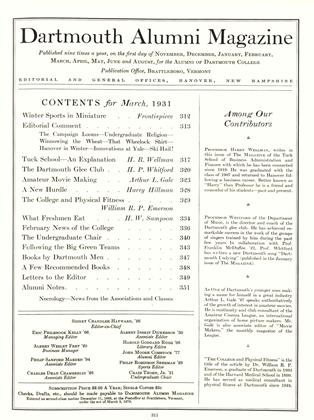By Henry R. Yiets, M.D., '12. Houghton, Mifflin and Company.
The oldest medical society, having an uninterrupted existence in this country, celebrates its one hundred and fiftieth anniversary this year, and this book by one of its members, Dr. Viets, is a contribution from the Massachusetts Medical Society to the Tercentenary Celebration of the Settling of the Massachusetts Bay Colony, offering a timely and interesting story in condensed form of the development of medicine and of the history of its foremost advocates in his state. The book is conveniently divided into six periods from 1620 to 1930, and is enhanced by an ample index and by a bibliography, is easy to follow and read, and is packed with a large amount of information.
In Massachusetts the few physicians, many without a medical degree, were largely assisted in the earlier days by the best educated members of the colony, the clergymen, whose main therapy was to "bleed and pray." Distinctions were made, however, for in 1631 one enterprising individual was fined and whipped for selling dearly a medicine of no value to cure "the scurvey." As doctors replaced the clergy we learn that in 1721, 80 years before Jenner's establishment of true vaccination, Dr. Zabdiel Boylston had directly inoculated with human small-pox virus more patients than had any other physician in the world at that time, and that he had lectured in England on his experiments in a daring and scientific attempt to control the ever dreaded epidemics of small-pox. It was not until 1800 that another Massachusetts physician, Dr. Waterhouse, succeeded against heavy opposition in convincing the medical profession of his state and country of the value of Jenner's method of vaccination, close upon the heels of the latter's fight in England.
Of interest to Dartmouth men among the list of notables in medical history in this neighboring state is the inclusion of the names of Nathan Smith, George C. Shattuck and Oliver "Wendell Holmes, all three known to Dartmouth as teacher or student or benefactor. The introduction of ether anaesthesia into actual use by the medical profession is Massachusetts' proudest medical boast, and the storm that raged about its early days is succinctly and fairly told in a special section.
In reading this book one is amazed anew at the appalling handicaps that sickness brought to the early colonists, and at the rapid growth of medicine in this one state, always outstanding in its contributions to medicine by a large group of able and famous doctors. One feels truly grateful to Dr. Viets for this admirable and brief treatment of a remarkable story.
 View Full Issue
View Full Issue
More From This Issue
-
 Class Notes
Class NotesCLASS OF 1930
March 1931 By Albert I. Dickerson -
 Lettter from the Editor
Lettter from the EditorEditorial Comment
March 1931 -
 Article
ArticleAmateur Movie Making
March 1931 By Arthur L. Gale -
 Article
ArticleFebruary News of the College
March 1931 -
 Article
ArticleThe College and Physical Fitness
March 1931 By William R. P. Emerson, M. D. -
 Class Notes
Class NotesCLASS OF 1910
March 1931
Frederic P. Lord
-
 Class Notes
Class Notes1898
November 1954 By FREDERIC P. LORD, JAMES R. CHANDLER -
 Class Notes
Class Notes1898
February 1955 By FREDERIC P. LORD, JAMES R. CHANDLER -
 Class Notes
Class Notes1898
November 1955 By FREDERIC P. LORD, JAMES R. CHANDLER -
 Class Notes
Class Notes1898
April 1956 By FREDERIC P. LORD, JAMES R. CHANDLER -
 Class Notes
Class Notes1898
June 1956 By FREDERIC P. LORD, JAMES R. CHANDLER -
 Class Notes
Class Notes1898
March 1957 By FREDERIC P. LORD, JAMES R. CHANDLER
Books
-
 Books
BooksShelflife
Mar/Apr 2005 -
 Books
BooksYANKEE KINGDOM.
July 1960 By HERBERT W. HILL -
 Books
BooksTHE VALUE ISSUE OF BUSINESS.
JUNE 1967 By JAMES BRIAN QUINN -
 Books
BooksTHE IMAGINARY VOYAGE IN PROSE
May 1941 By James D. McCallum -
 Books
BooksRED VIRGIN SOIL: SOVIET LITERATURE IN THE 1920's.
DECEMBER 1968 By JOHN G. GARRARD -
 Books
BooksHISTORY, MAN AND REASON STUDY IN NINETEENTH-CENTURY THOUGHT.
JANUARY 1972 By MICHAEL Ermarth

